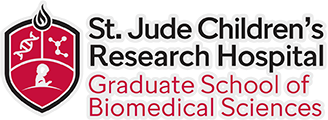
We welcome applicants from all scientific backgrounds (including early career clinicians) who wish to pursue a translational research career.
Keep scrolling for a guide to the materials you need to complete your application.
Subscribe to our email list to receive program updates and a reminder when the application period is closing.
Admissions Timeline (Entering Class)
| Dates | Admission Process |
|---|---|
September 1 |
Application period opens |
December 1, 11:59 p.m. PST |
Applications must be submitted with all supporting materials |
Mid-January and early February |
Candidates visit St. Jude campus for interviews and tours |
February |
Issuance of decision letters begins |
April 15 |
Acceptance of admission offer due |
August 5 |
Orientation |
August 12 |
First day of class |
Eligibility
Our program is designed to launch you quickly from your studies into independent research. We do require a background in science.
Required Scientific Preparation
- Previous exposure to laboratory research
Undergraduate degree (BA, BS or equivalent) in:
- Biology
- Chemistry
- Mathematics
- Physics
- Similar science discipline
If you already hold (or are pursuing) a related advanced degree (e.g., MD, DO, PharmD, DVM or DDS), we encourage you to apply.
Additional Minimum Criteria
- U.S. citizenship or permanent resident status
- English language proficiency
No GRE or MCAT
- No Graduate Record Examination (GRE) or Medical College Admission Test (MCAT) scores or percentiles are required.
How to Apply
Our required online application guides you through each step. You may save your application at any time and complete it later, as long as it is submitted before the December 1 deadline.
Your Application
In the online application, you will be asked to provide demographic information and the following materials (please check application for accepted file formats):
- A curriculum vitae that describes in full detail the applicant’s academic background, including degrees, research experience, awards, publications, presentations, and other achievements.
- Unofficial transcripts of academic records (final, official transcripts are due upon matriculation). The unofficial transcripts should be submitted via the online application. Transcripts not in English must be accompanied by a certified word-by-word, English translation and uploaded online during the application process. Official transcripts should be sent directly to the Graduate School Registrar.
- Letters of reference from three mentors, professors, or program directors. The letters should describe the student’s academic successes, background in research, potential for achievement at the graduate level, and capacity for creative, self-directed study.
- Previous exposure to laboratory research is required. Submit a one-page original scientific summary of your most important research experience. Your description should be appropriate for a scientific audience. Describe the goal(s) of your research, the reason that your question(s) is/are important, your hypothesis(es), how you investigated your questions, and what conclusions or findings, if any, you were able to draw. Prior research abstracts from a grant proposal or paper should not be used.
- A two-page personal statement outlining your reasons for pursuing a graduate degree in biomedical sciences, your career goals, and relevant experience. Consider how your background and life experiences or challenges may have motivated or impacted your decision and/or differentiate you as a candidate. State your specific interest in the St. Jude Biomedical Sciences PhD program, identify two to three faculty whose research interests you, and explain why.
Required References
In the online application, you will be asked to provide email addresses of up to five (and no less than three) individuals who will be providing letters of reference. The system will automatically contact them. Referees should be prepared to describe your academic successes, background in research, potential for achievement at the graduate level and capacity for creative, self-directed study.
Contact us
For questions regarding the BMS PhD Program at St. Jude, please contact us at BMSPhD@stjude.org or 901-595-4581.
Our vision
Our vision for “collaborative and translational research” that leads to scientific discovery depends on an environment of diversity which presents itself in many different forms, including race or ethnicity, religion, sex, nationality or place of origin, disability, socioeconomic status and unique work or life experience. The Graduate School is committed to cultivating a welcoming environment that values different backgrounds, approaches and perspectives—all essential ingredients for true academic excellence. We have a strong history to build on and the commitment to create a stronger future.
Our History
November 2015 marked the official launch of the St. Jude Children’s Research Hospital Graduate School of Biomedical Sciences (Graduate School). This institution was designed to provide exemplary graduate education for the next generation of biomedical researchers. The graduate school represents a major milestone in the history of St. Jude Children’s Research Hospital (St. Jude).
The training of biomedical scientists has always been a key component of the hospital’s mission, with hundreds of postdoctoral fellows, medical students, and clinical fellows annually contributing to ongoing patient care and research. Graduate student training has also been an educational priority, historically occurring through affiliations with other schools and colleges.
St. Jude leadership recognized that the world-class faculty, research, and facilities at St. Jude represent the perfect environment for graduate training, particularly in the area of translational medicine. This idea continued to evolve over the years, and in June 2015, the Hospital’s Board of Governors approved the Graduate School’s establishment.
The subsequent development of the Graduate School has been rapid. The Tennessee Higher Education Commission (THEC) formally approved the school in November 2015; the Hospital created a Board of Trustees and Advisory Board and recruited a highly experienced staff in 2016. With the infrastructure and curriculum in place, the inaugural class of 12 students arrived on campus in July 2017 to begin their doctoral studies.
In 2018, the Graduate School began working with the St. Jude Department of Global Pediatric Medicine to design a new online Master of Science program in Global Child Health with the goal of creating agents of change by providing health care professionals around the world with skills and knowledge to improve treatment, care and survival rates of children with cancer and other illnesses. The Global Child Health master’s program was approved by Graduate School’s Board of Trustees in August 2018 and by THEC in January 2019. The first cohort of 10 students representing 10 different countries began their studies in July 2019.
In 2020, the Graduate School began working with St. Jude clinical investigators to design an additional master’s program: a Master of Science in Clinical Investigations with the goal of training junior health professionals in all aspects of clinical investigations, including designing, conducting, and reporting results from those investigations. Students have the benefit of training in an institution heavily involved in clinical investigations for pediatric catastrophic diseases. The degree program was approved by the Graduate School’s Board of Trustees in April 2020 and by THEC in July 2020. The first cohort began their studies in July 2021.
The current goal of each academic program is in perfect alignment with the mission, values, and vision of St. Jude.
In 2023, the Graduate School began working with St. Jude faculty members in multiple departments to design a new Master of Science program in Applied Biomedical Data Sciences to train students to apply biostatistics, bioinformatics, computational biology and data wrangling methods in an ethically sound and scientifically rigorous manner to evaluate complex data sets to advance biomedical understanding and knowledge. The new Applied Biomedical Data Sciences degree program was approved by the Graduate’s School’s Board of Trustees in November 2023 and by THEC in January 2024. We will welcome the first cohort of students in August of 2025.
Our Commitment
St. Jude Children’s Research Hospital Graduate School of Biomedical Sciences does not discriminate or grant a preference on the basis of race, national origin, sex, genetic information, age, religion, disability, veteran’s status, disabled veteran’s status or any other status protected by federal or Tennessee law. The St. Jude Children’s Research Hospital Graduate School of Biomedical Sciences is committed to creating a welcoming learning environment.
More detailed admissions and eligibility information is available in our Academic Catalog and Student Handbook (PDF)
The St. Jude Children's Research Hospital Graduate School of Biomedical Sciences is authorized for operation as a postsecondary educational institution by the Tennessee Higher Education Commission. In order to view detailed job placement and graduation information on the programs offered by the St. Jude Children's Research Hospital Graduate School of Biomedical Sciences, please see the Authorized Institutions and Data.

